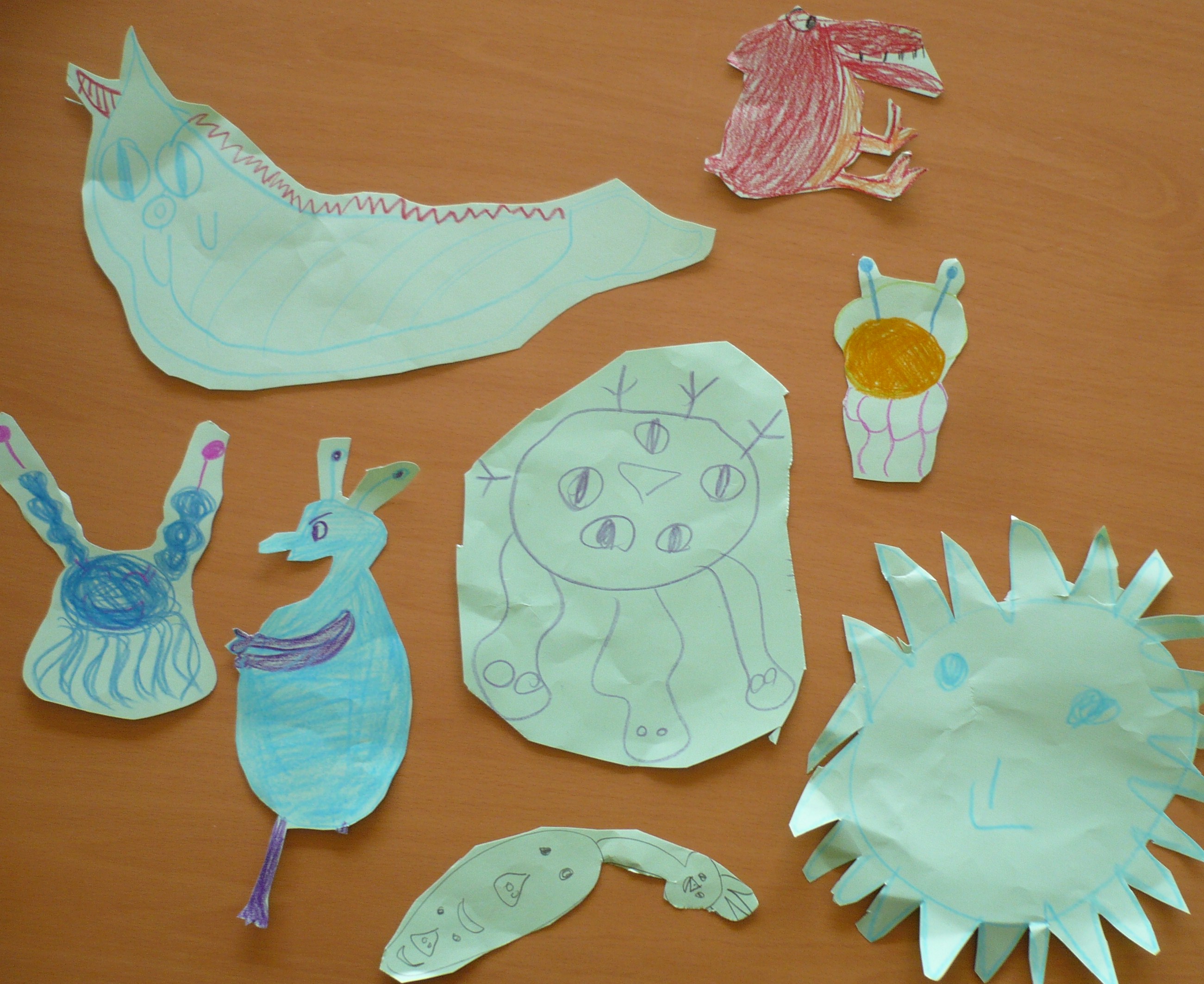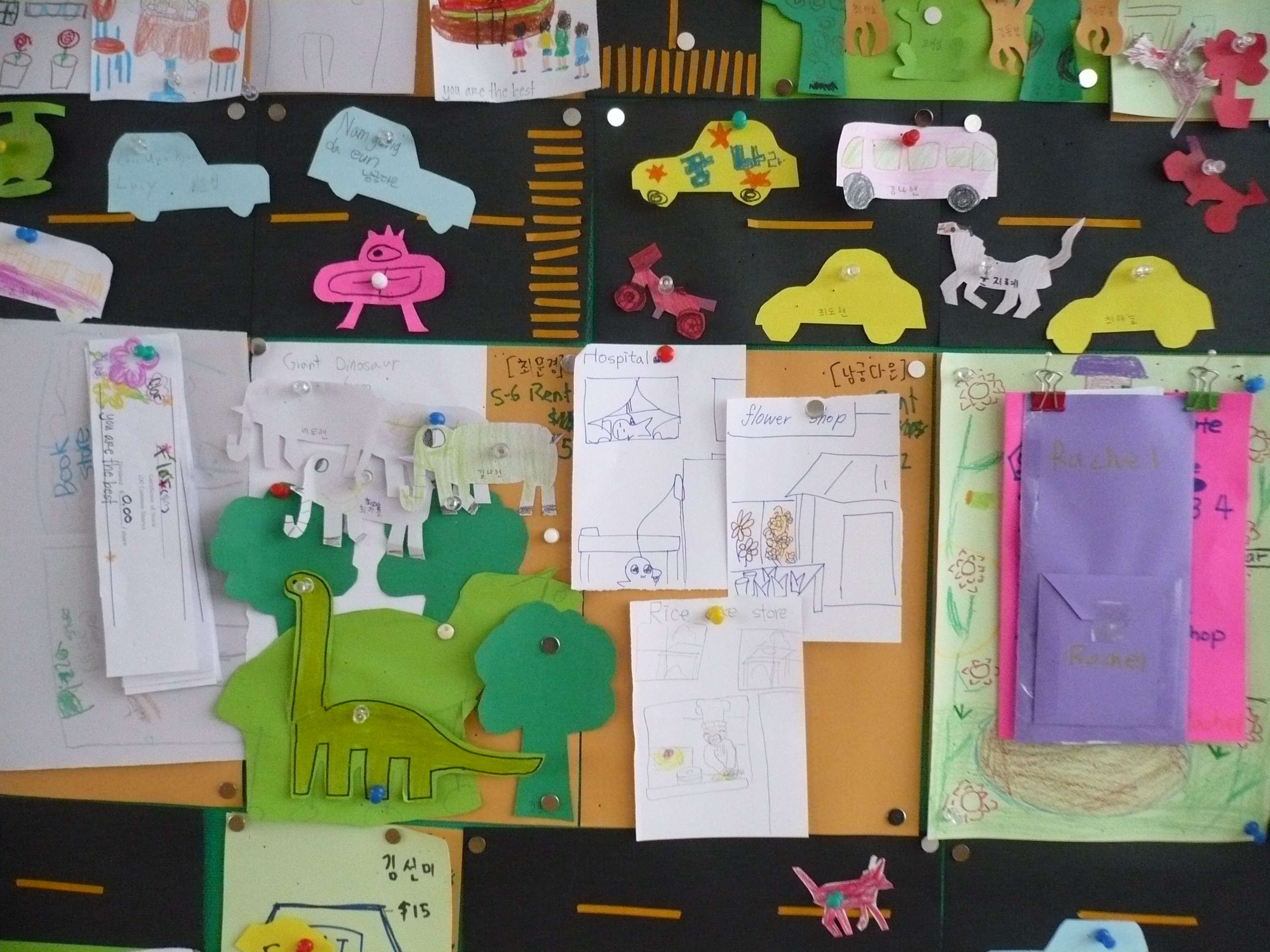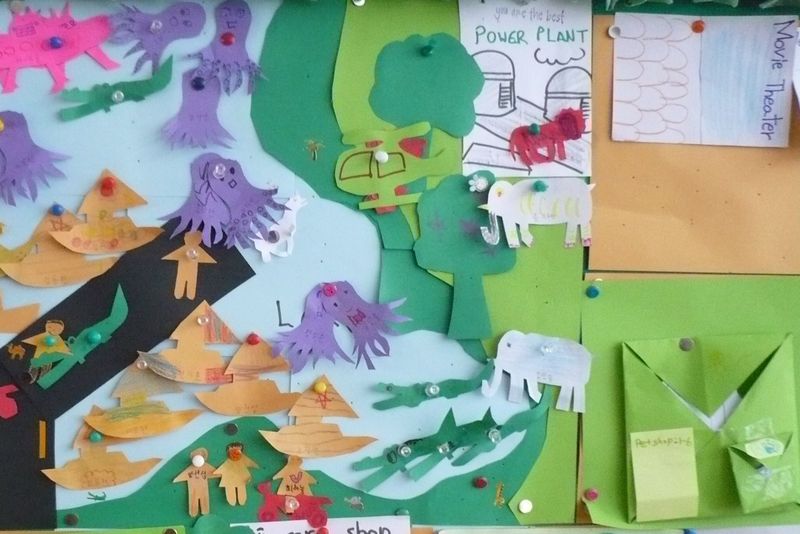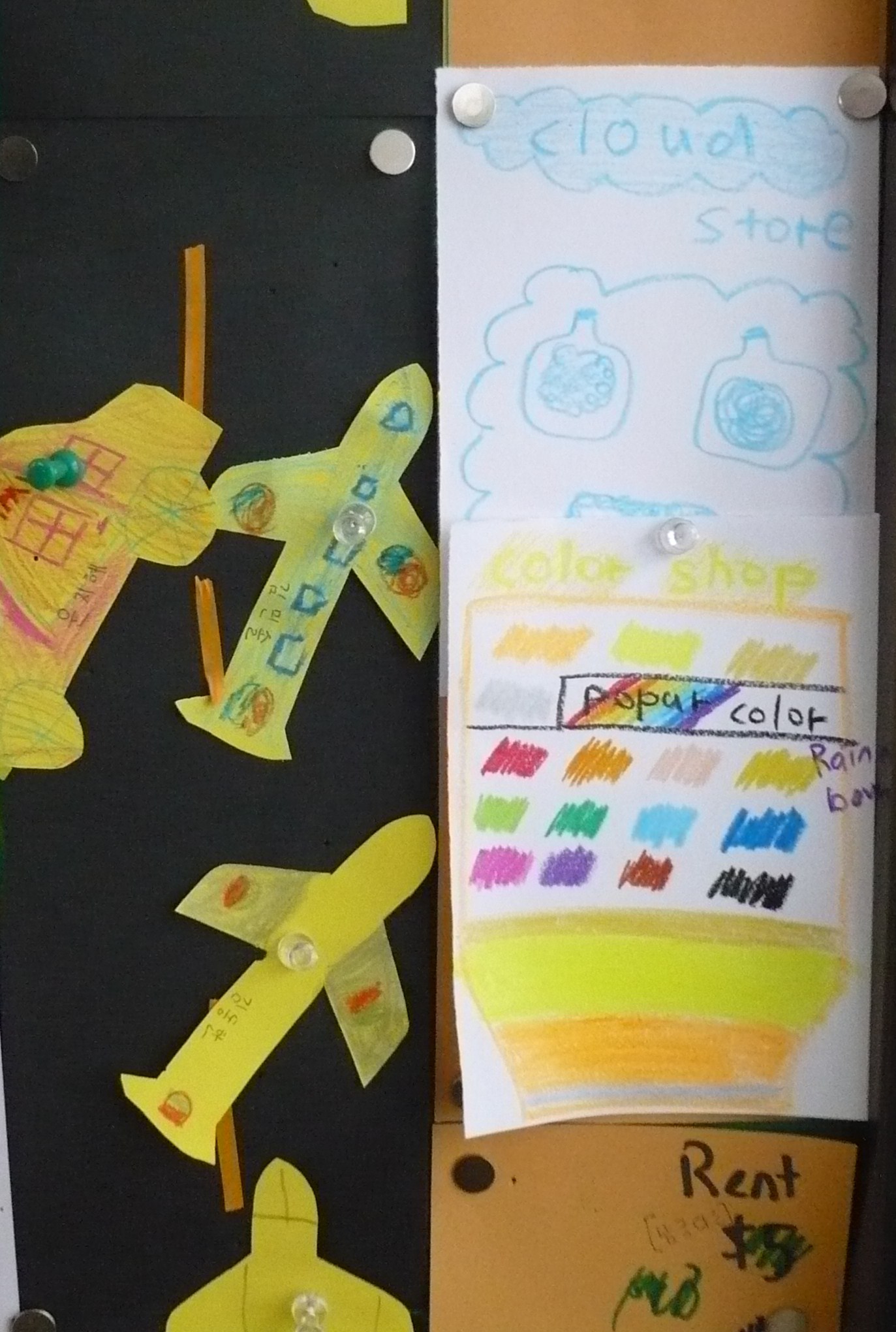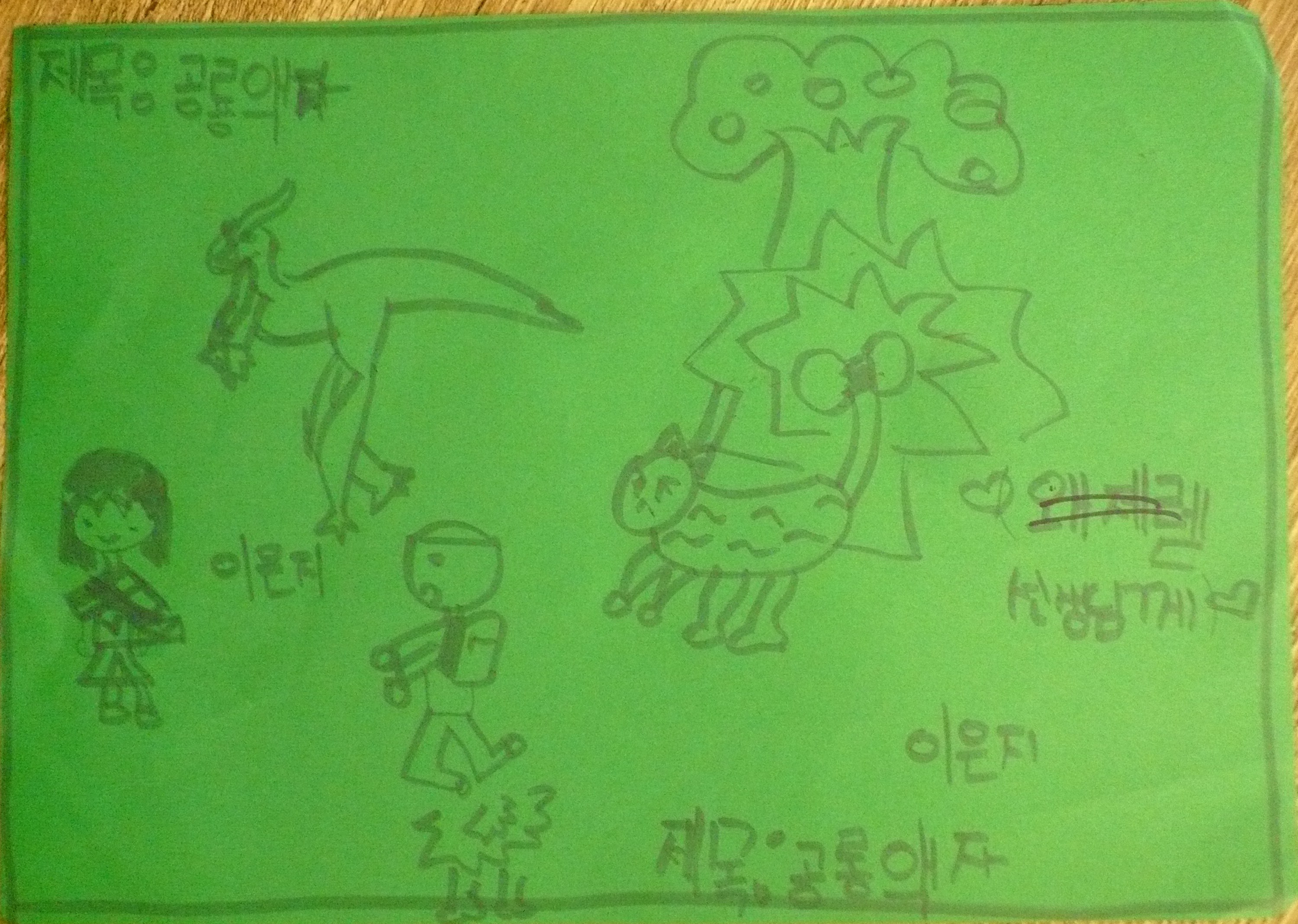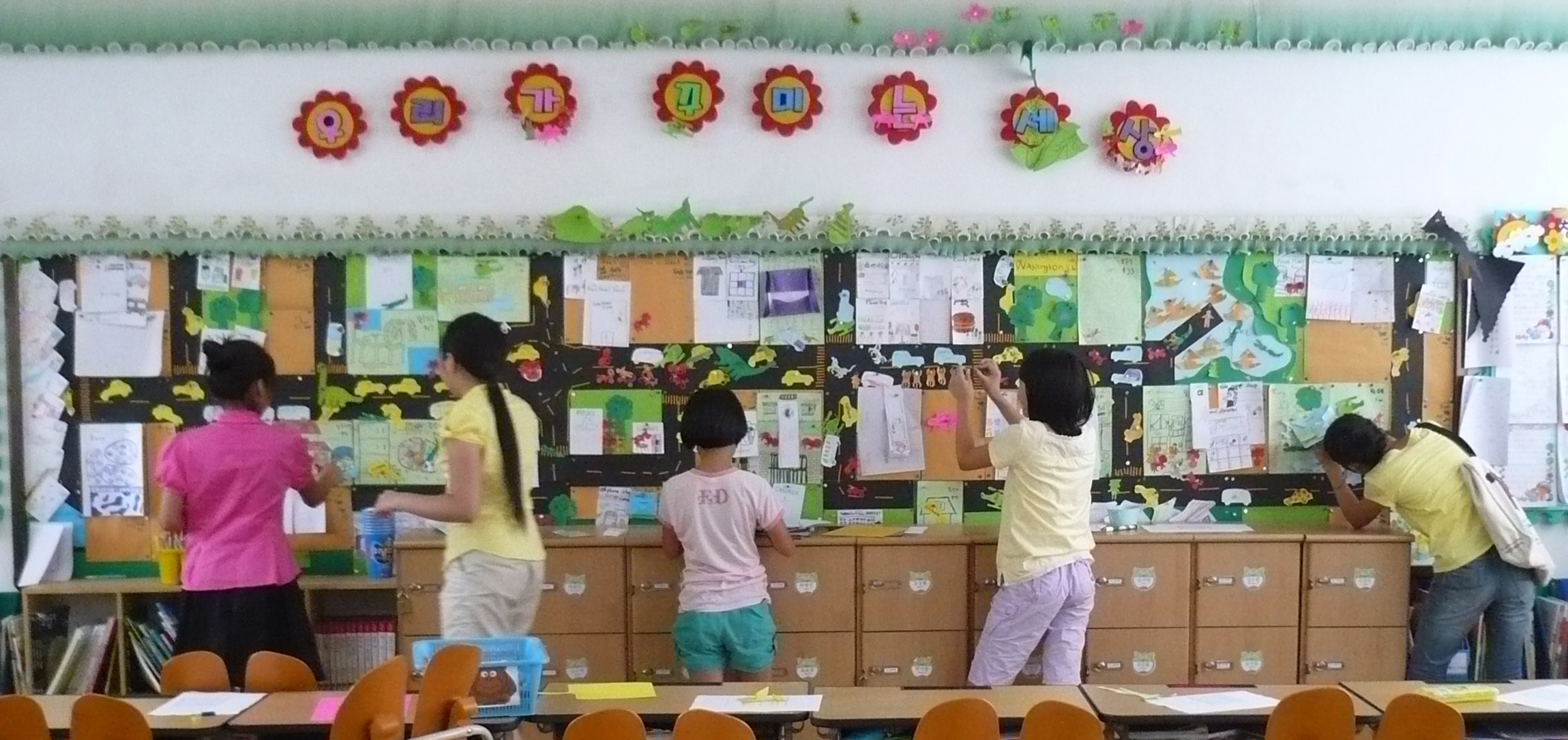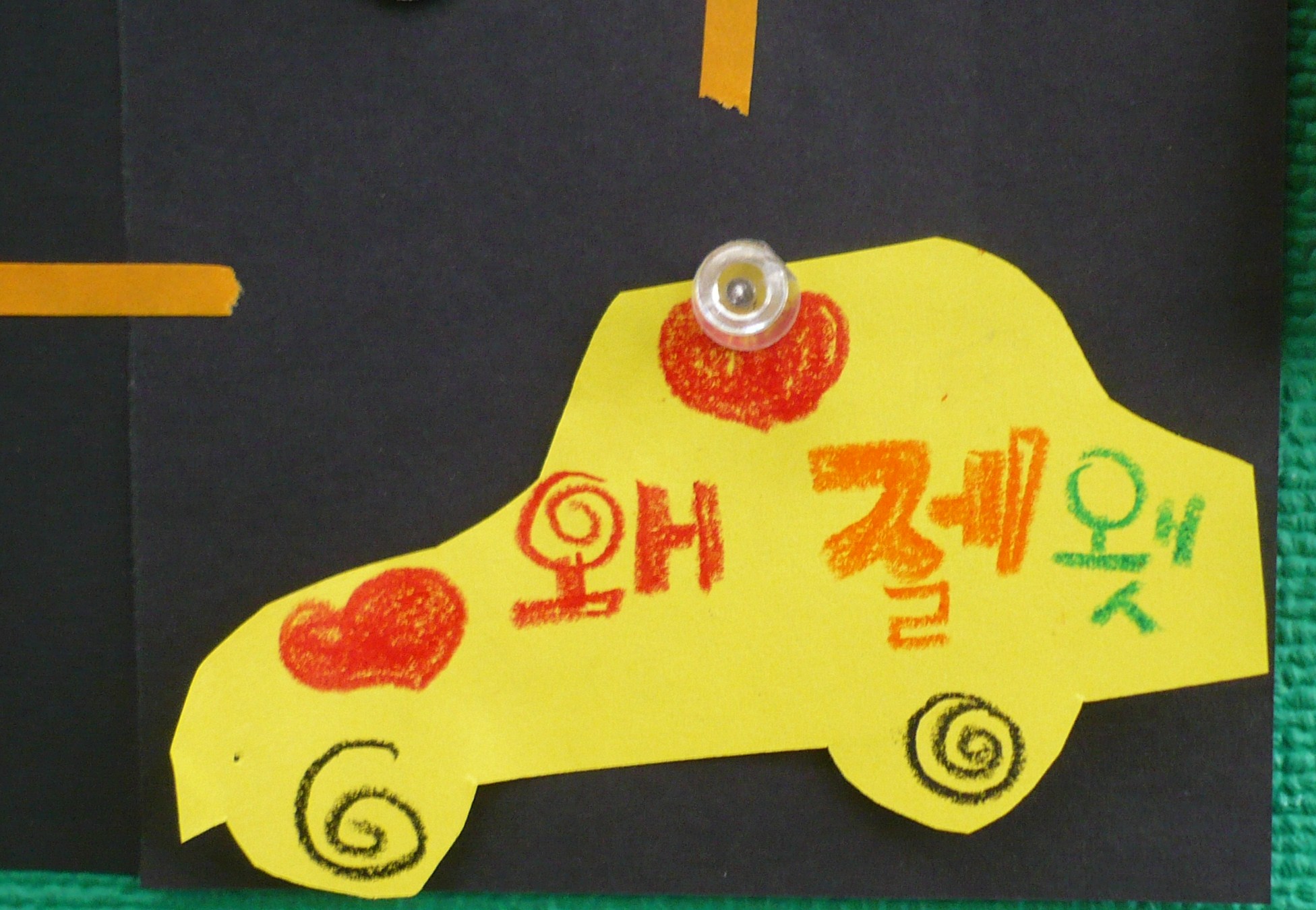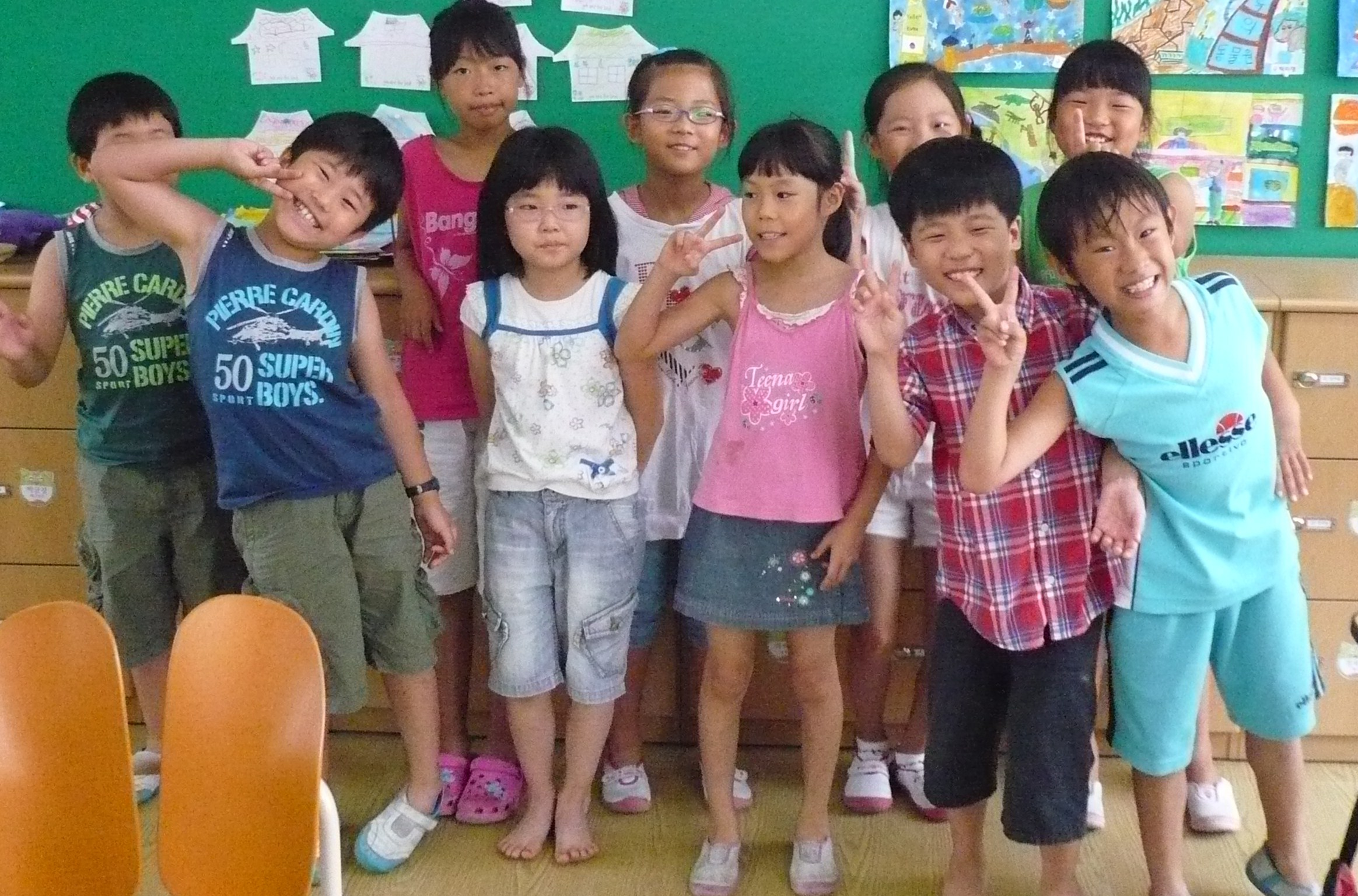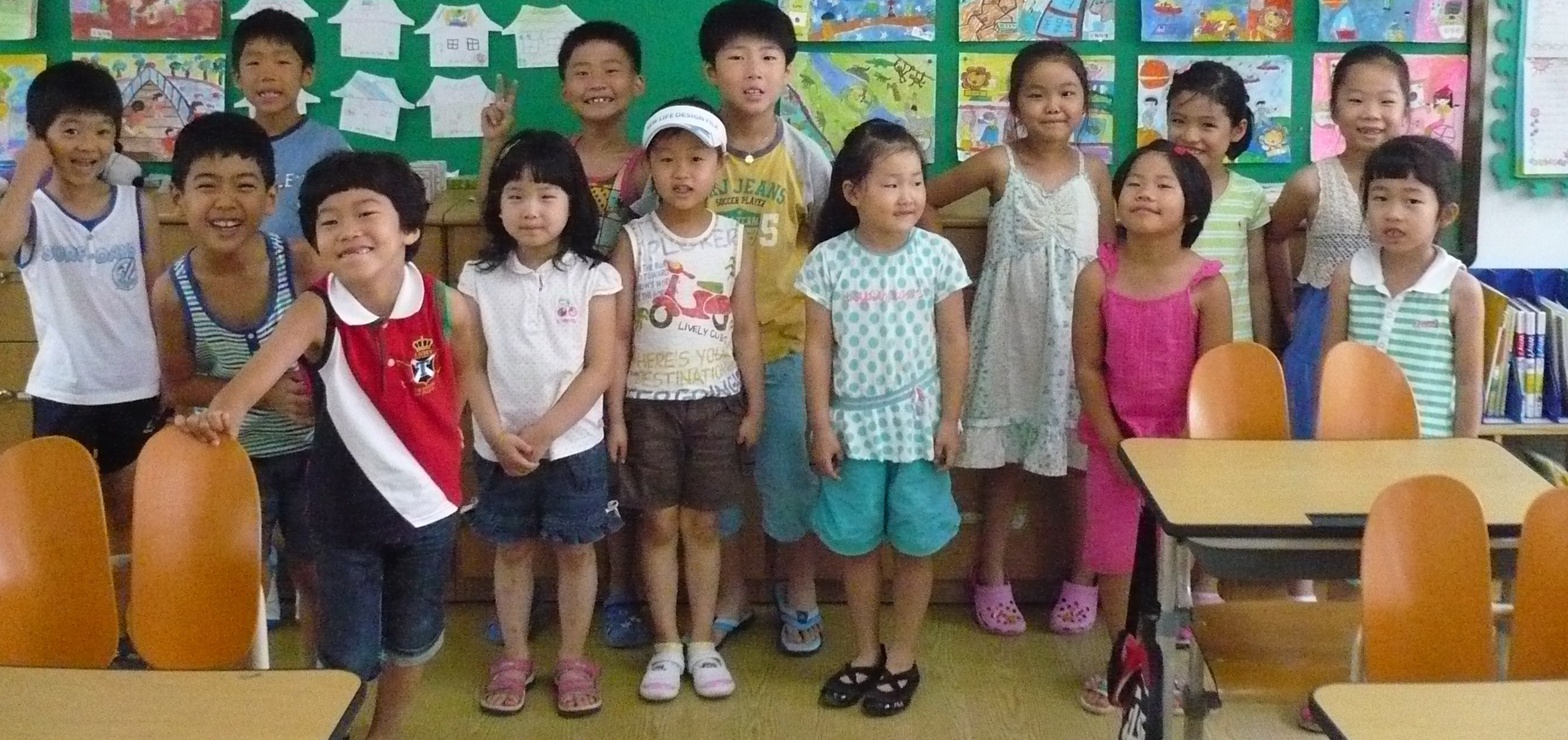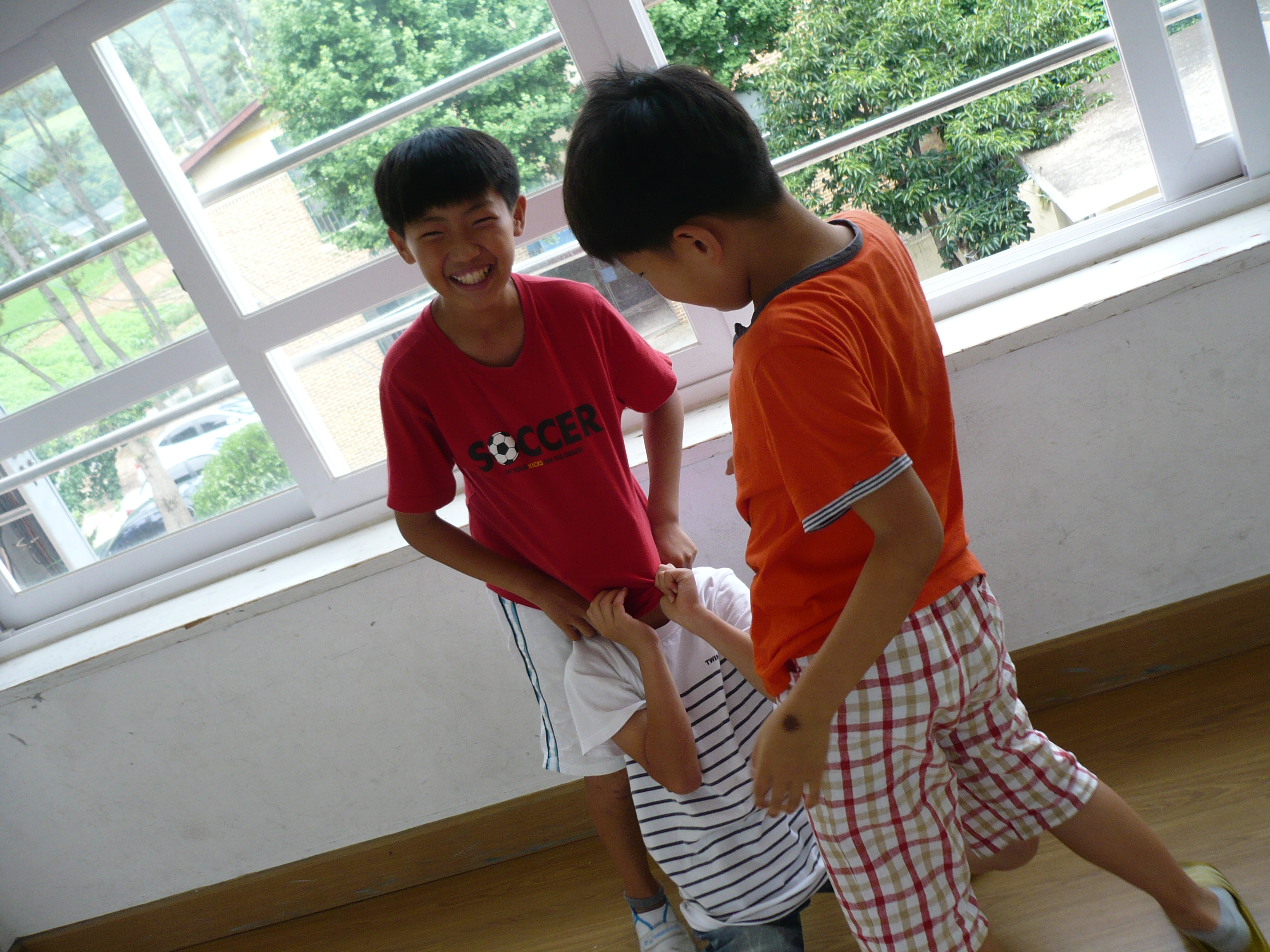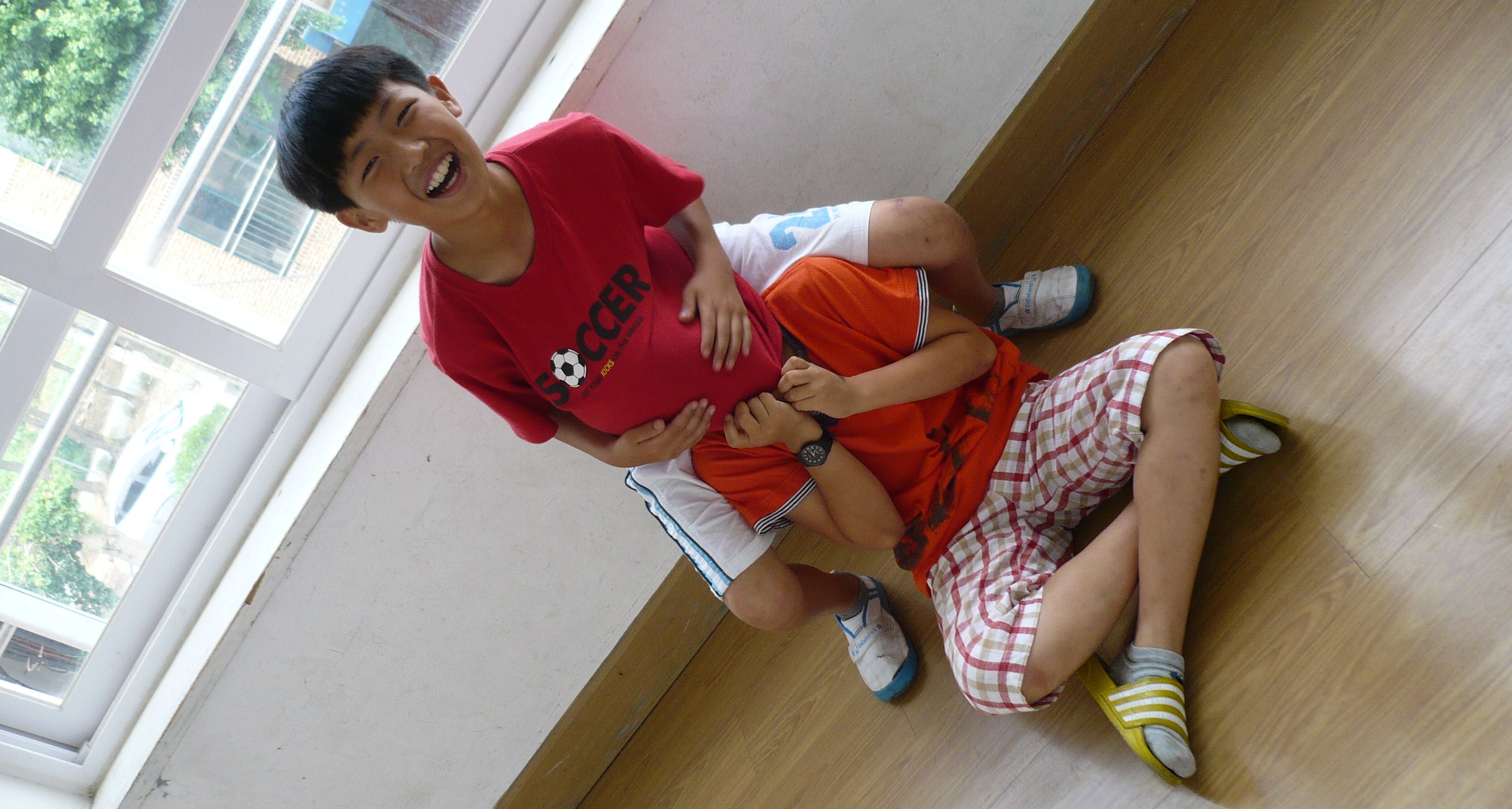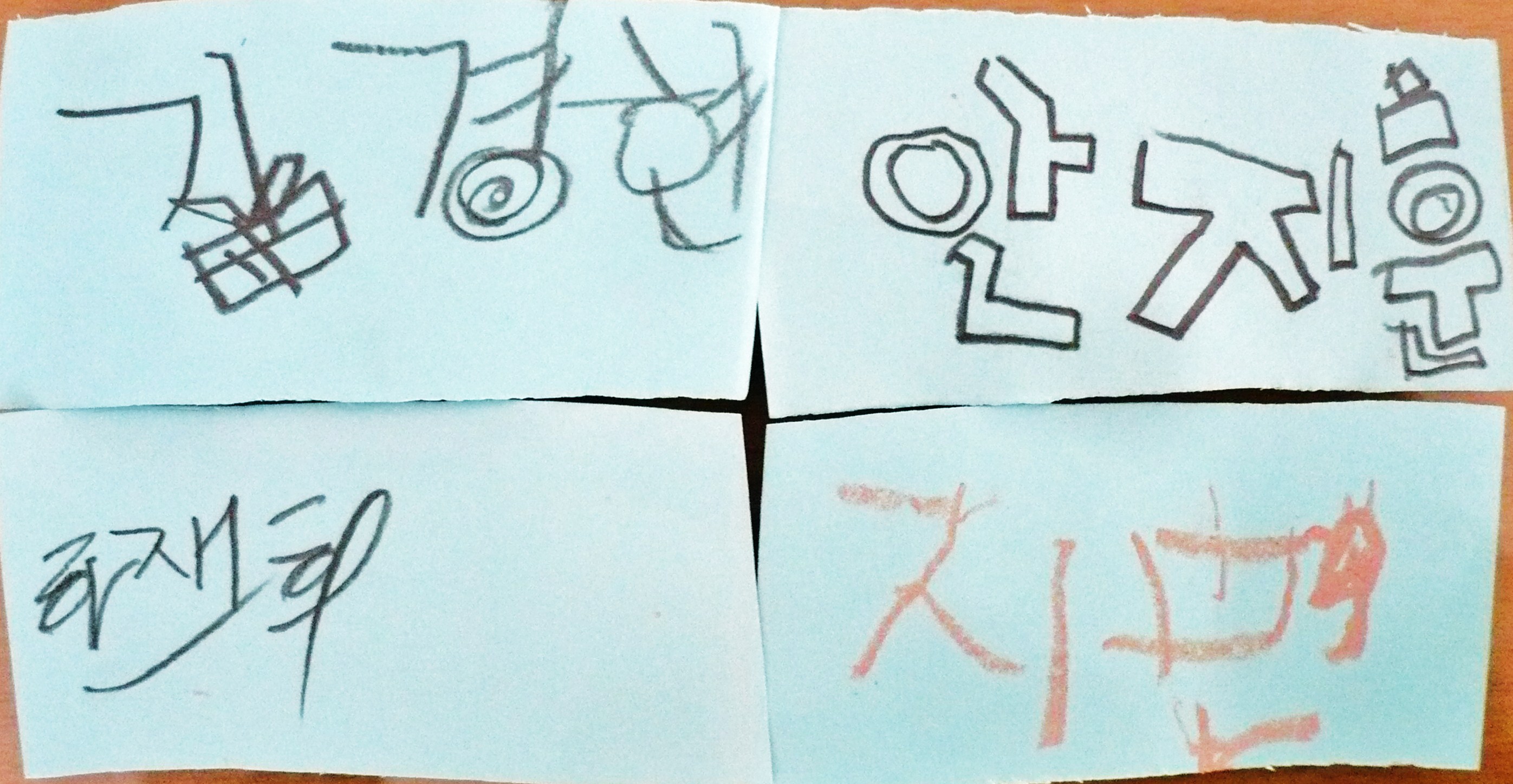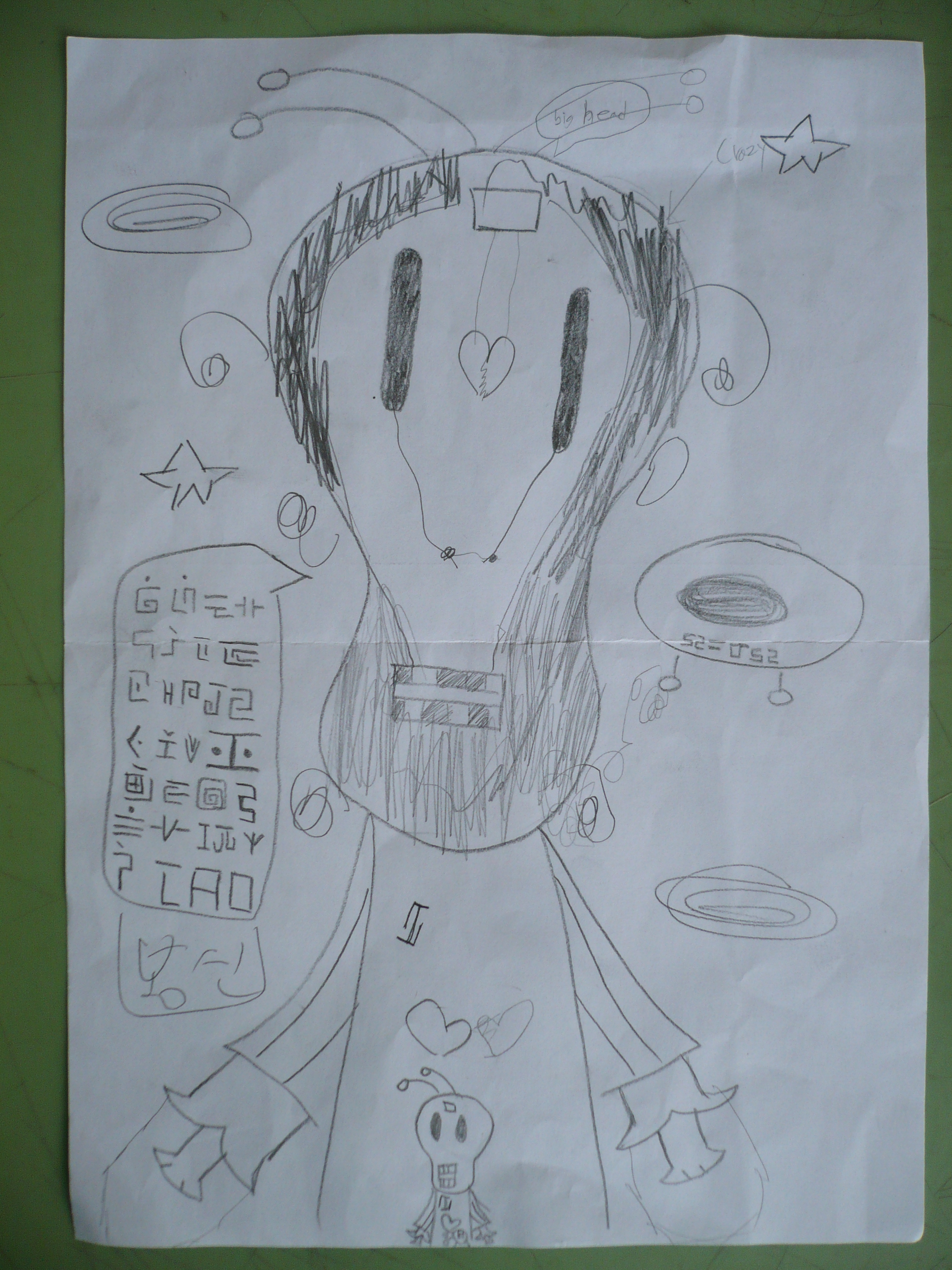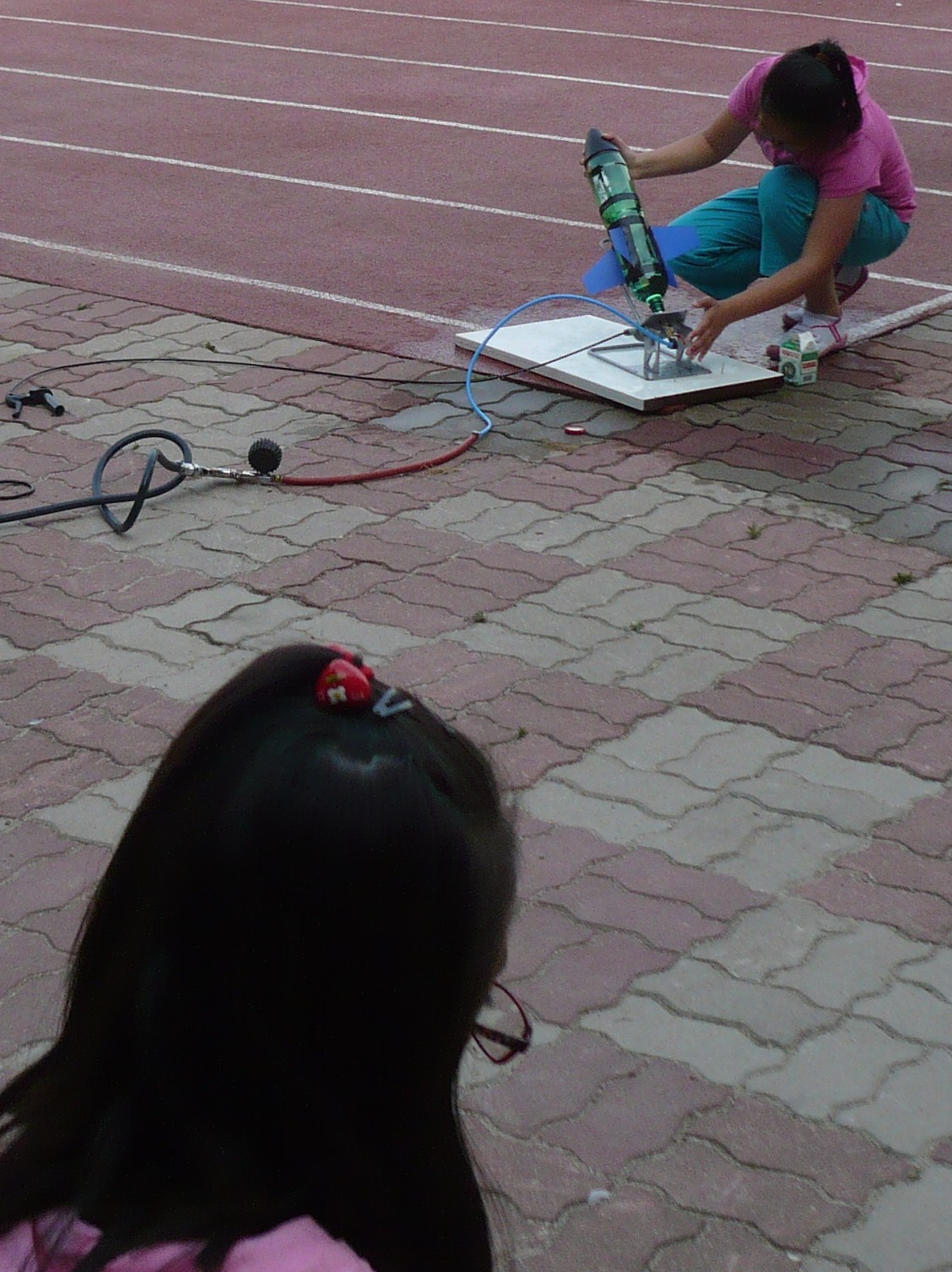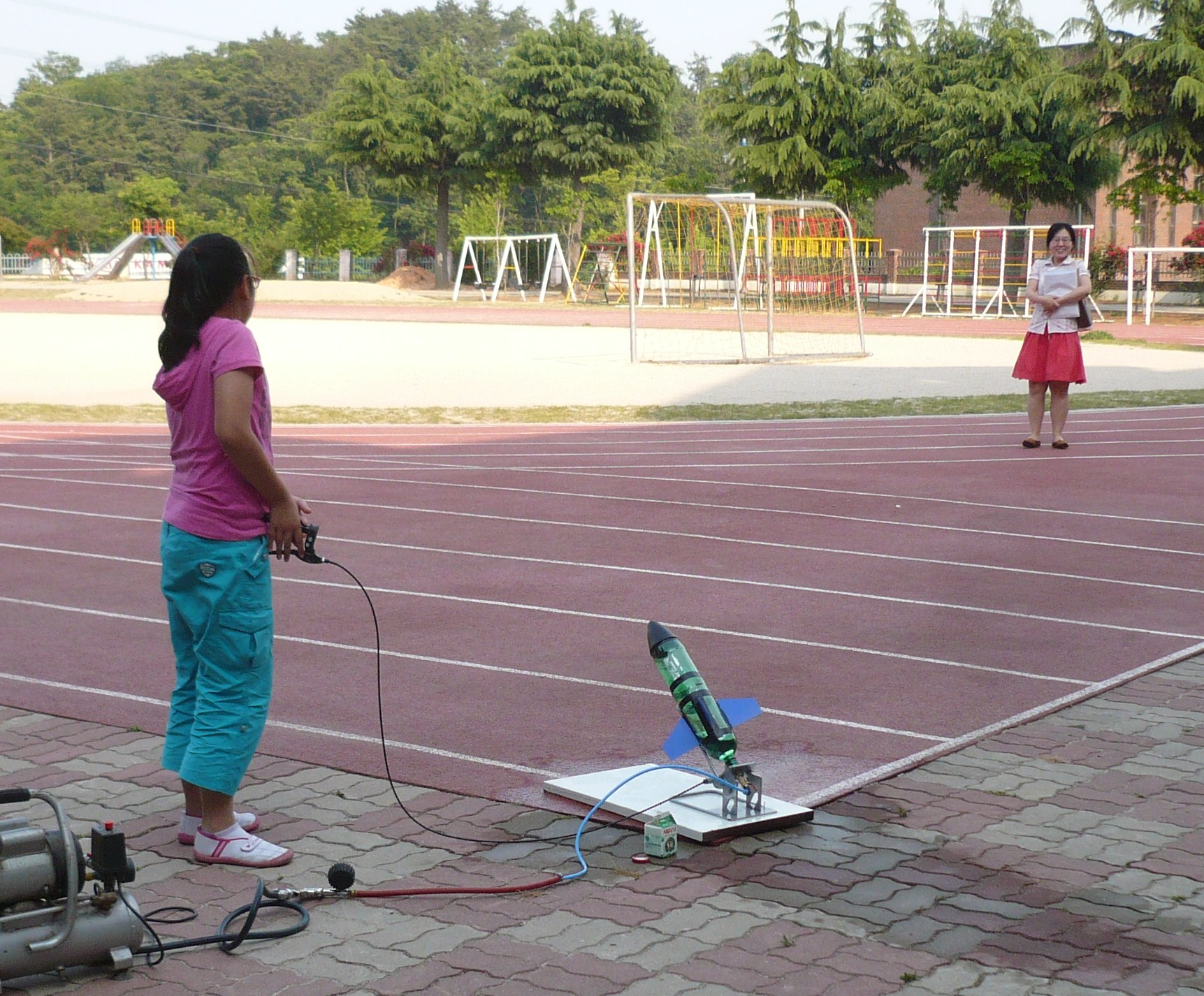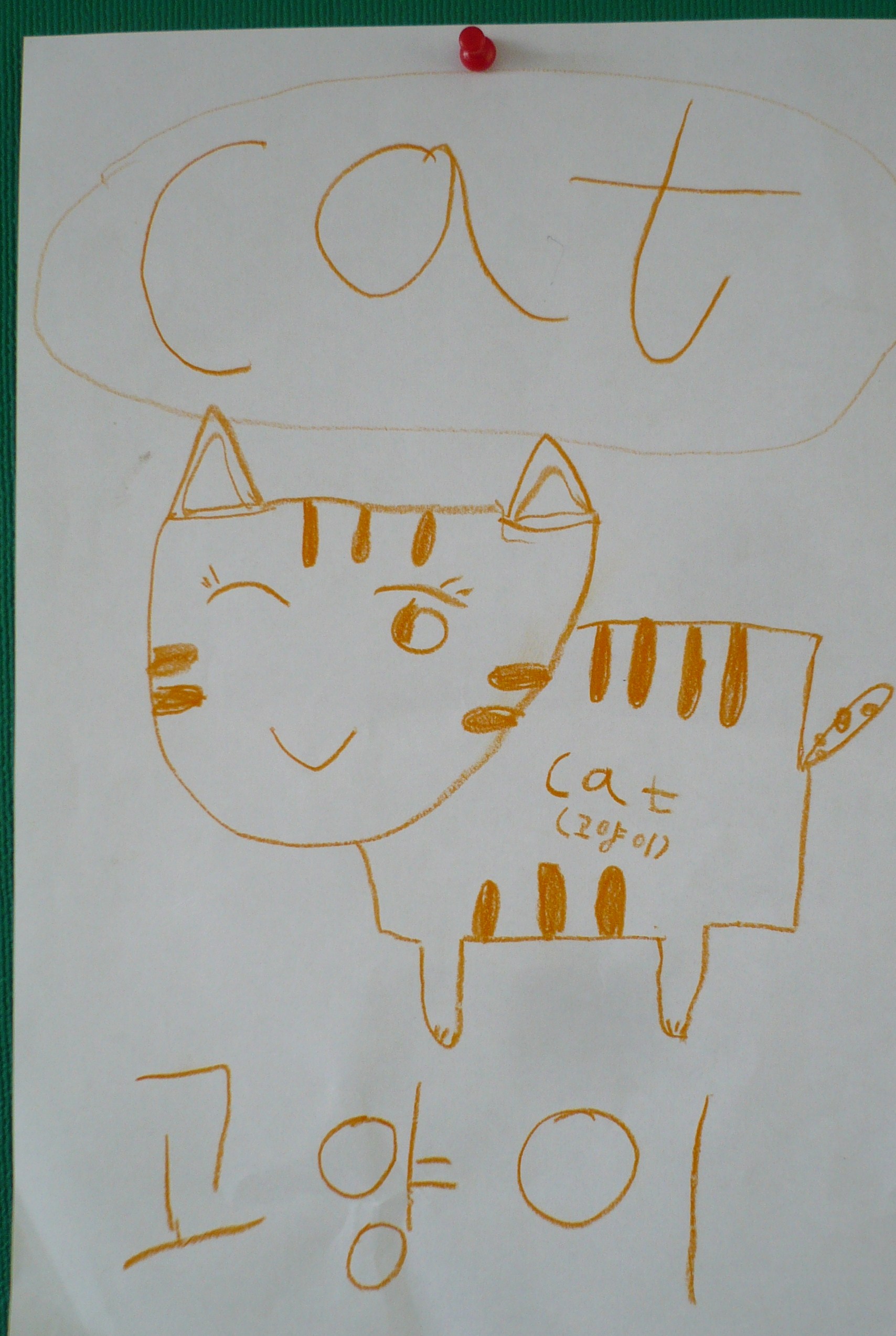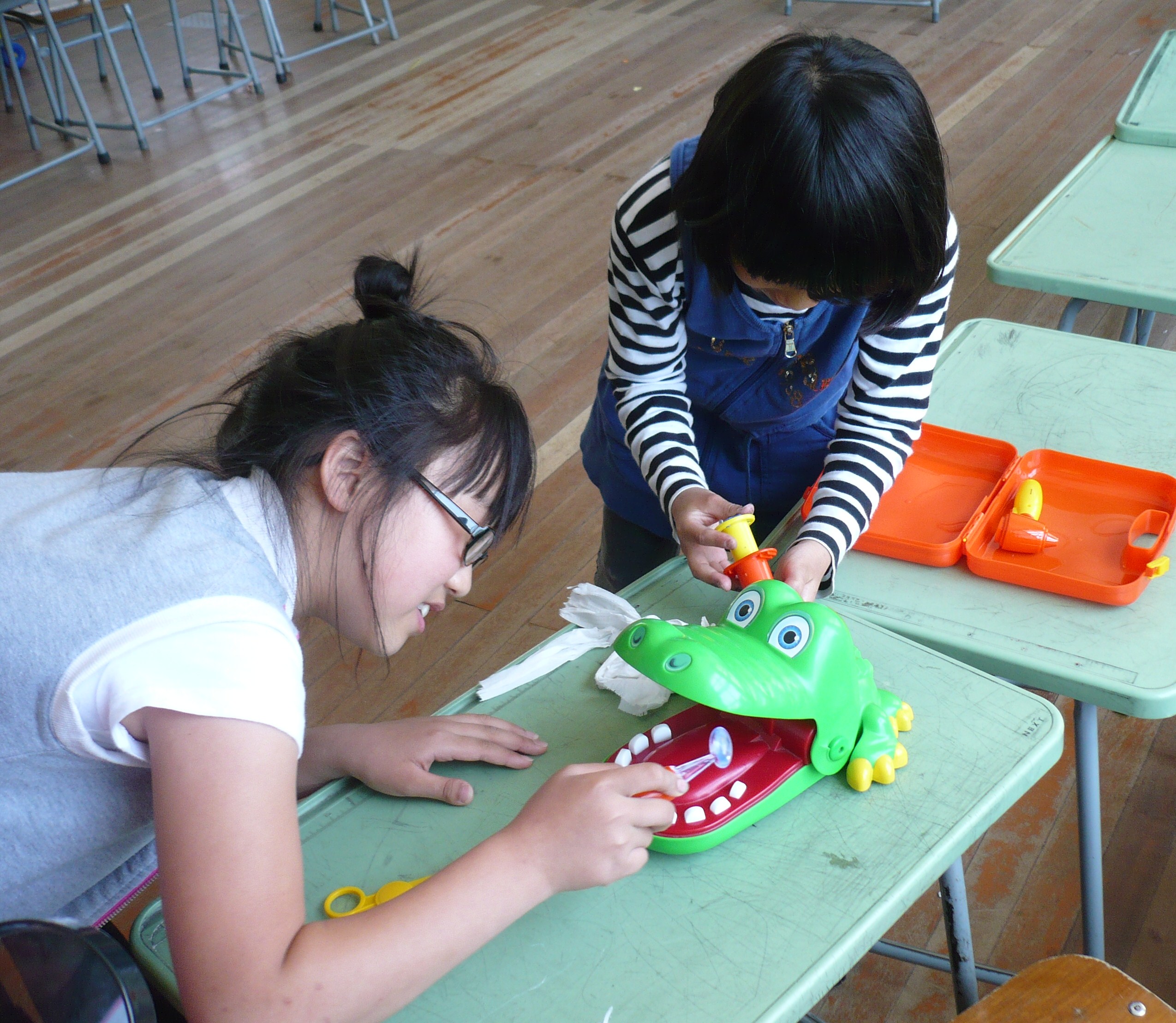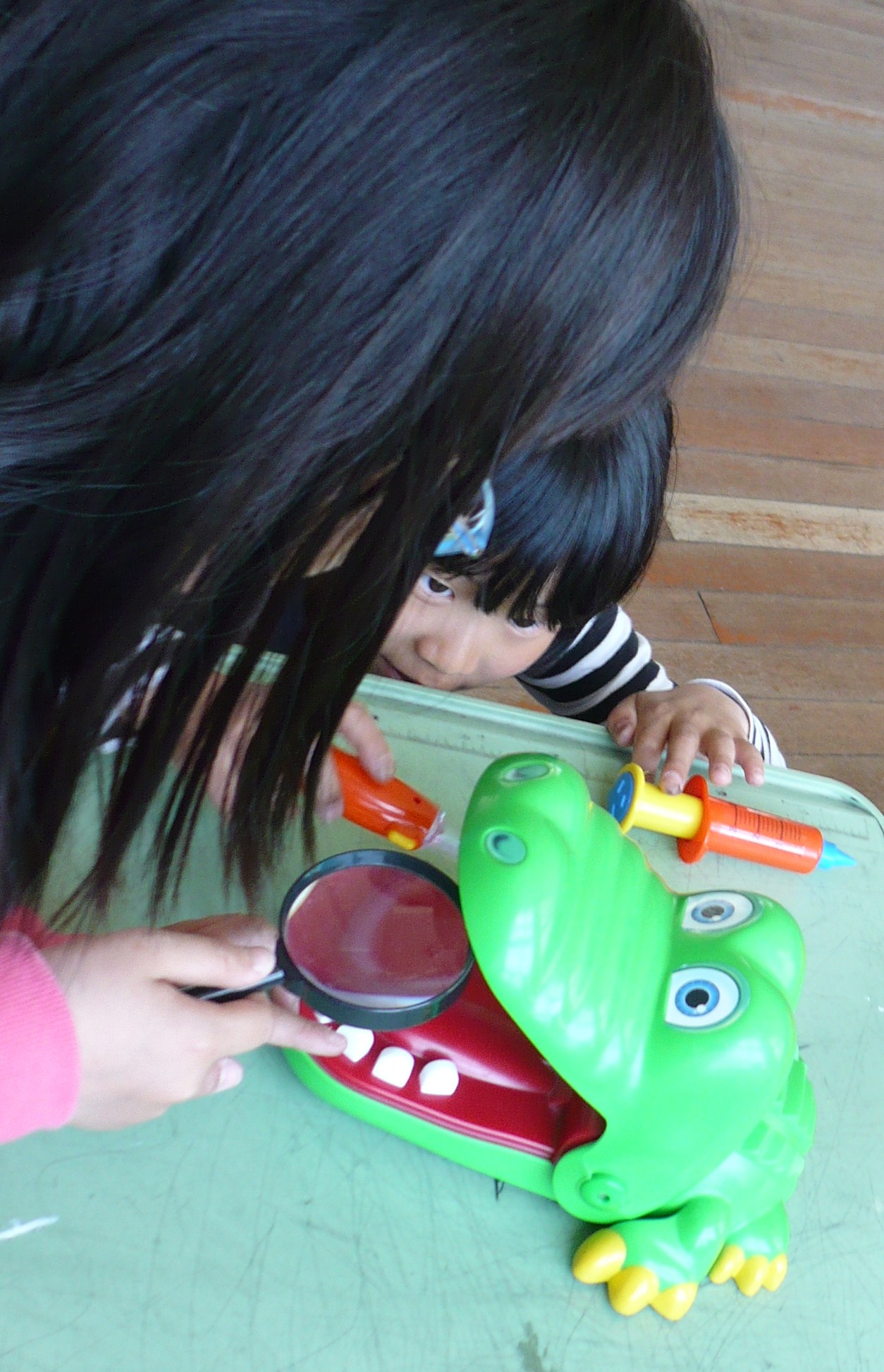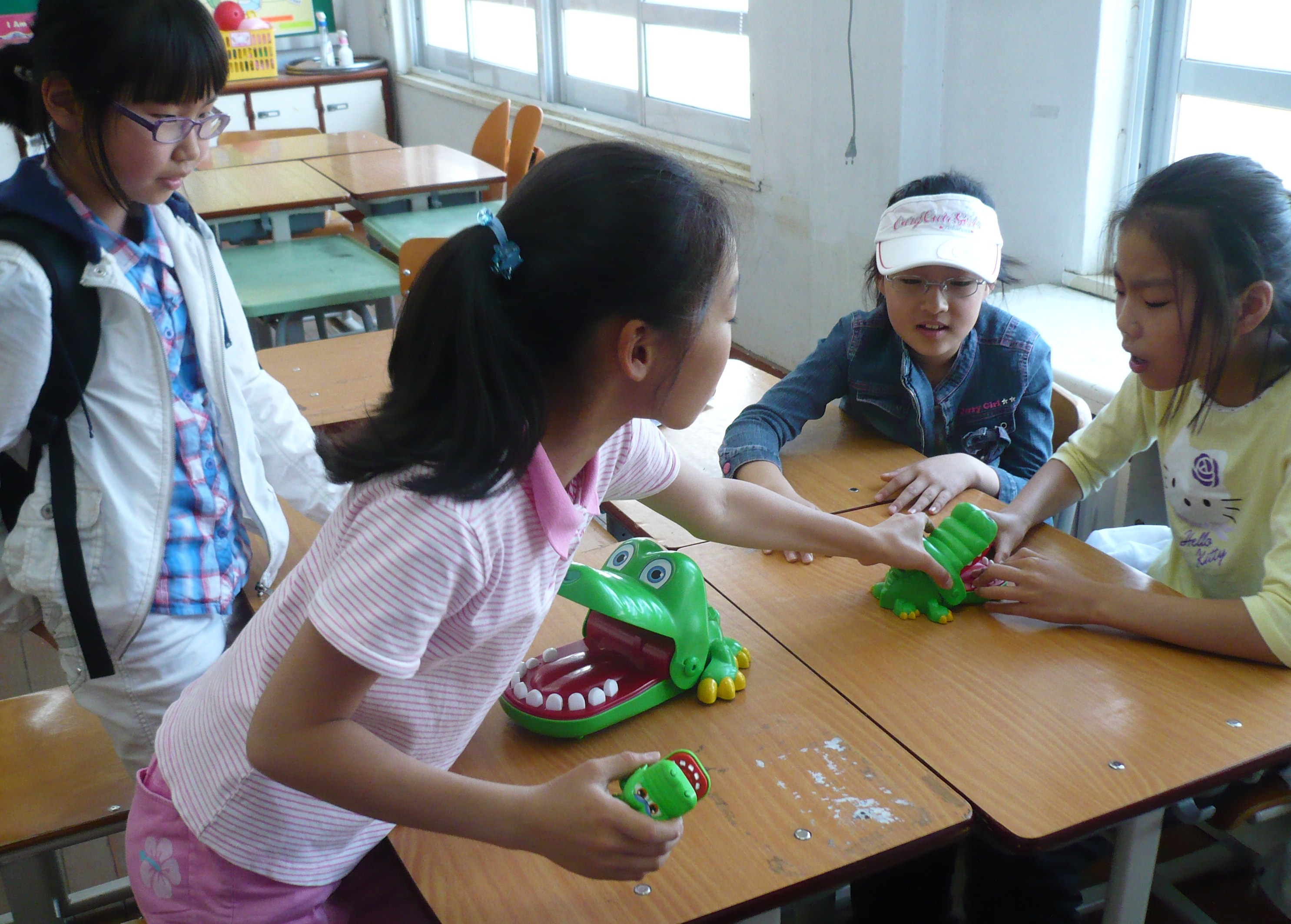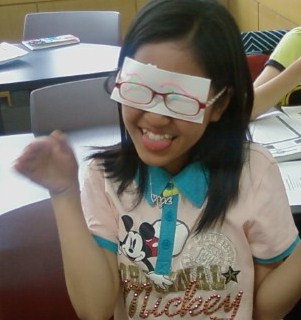I don’t love every incidental of my job. I fear and distrust the caricature of bureaucratic malevolence that is my vice principal. My principal seems to judge his staff largely on the basis of their skill as volleyball players, rather than on their competence as teachers – and because of this, I rate as a liability rather than as an asset, in his view of the school organization. The administrative office has epically bungled my housing situation, and I have consequently endured interminable and yet untellable travails of minor expense and mild inconvenience. Some of my coworkers are either so shy or so xenophobic that I dread interacting with them. And of course, the Korean Communication Taboo frequently imposes its unexpected and unforeseeable frustrations.
Oh, yesterday, I had a really difficult day. I ended up grumpy and frustrated. The thing is… I’ve been having some really good days, and feeling really good about my job, lately. So yesterday was frustrating because it felt like a major loss of progress, a major step backwards. The sixth graders during the regular morning classes were being rude, rowdy, and there was nothing my coteacher or I could do to bring things back under control. I felt like a lot of the problem was that my coteacher and I don’t know how to “use” each other effectively, and I blame myself and my lack of experience for that.
So. Hard day.
Yet, despite these issues, and despite yesterday, the fact is that my “on the ground” work, in the classroom, has been going simply great. I am not a perfect teacher, I’m sure. I’m probably deficient in many ways, that I can’t even perceive. But I have fun. Even yesterday, I had great fun with my afterschool classes, where I have a lot of autonomy and control.
Mostly, I really like my job, in a sincere and deep-felt way, and I derive immense satisfaction from my interactions with the children and even many of my coworkers.
On this most recent past Monday, for some reason, I felt this even more strongly than usual. As I arrived home after a tiring yet overall satisfying day, I had this weird, unwonted, utterly guileless thought: “I like my job.” The several days since then haven’t gone so smoothly, but regardless – perhaps this is a kind of pep-talk to myself – I’ve decided to make a little journal of Monday’s minutiae, as a record of a “typical” good day in my current career.
*-*
[Monday, October 18, 2010]
I awoke at 5:20, roughly. I have an alarm set, always, but most days, I wake up before the alarm. I wake up very slowly. I think about things. I doze, and let the “snooze” feature of my alarm earn its keep. Finally, at about 5:45, I get up, turn on the electric kettle, and get out some instant coffee. I love brewed coffee, but I’m a deeply lazy person, especially first thing in the morning, and I love convenience much more than brewed coffee. For that reason, I use instant coffee. I need the caffeine more than any kind of spectacular taste.
I put on something warmer to wear. I still keep my window wide open 24/7, and the nights, these days, are cool. Under my cover, I don’t need extra clothing, but up and about, I feel the slight chill. I open my little netbook computer, and begin to wonder what I will write in the blog. I write some fragments of dreams in my more private journal, and I open a text file of a story-in-progress, in the off chance that I’ll think of what to put next. Not likely, but it’s perhaps good to be optimistic, right?
I surf to my most typical websites: LA Times, The Atlantic magazine, Facebook. What’s happening in the world? I find an article in a blog, that interests me, and follow links to something new. I record notes in my “websurfing journal” – mostly just pasting links with one- or two- word observations or snippets of thought. I am an unrequited but unrepentant scholar, at heart.
I drink some coffee. This morning, I decide to have toast for breakfast, with my approximately four cups of coffee. I generally have either toast, or, if I’ve got left over rice, I’ll have a Korean breakfast of rice and kimchi.
I finally choose something to put into my blog – many times, I have things partially or even completely “pre-written” in my journal, and I just copy and paste them into the blog. Other times, I just write it out, right at the moment, in the box on the administrative website. This morning, I do the latter, pasting in a long quote from a blog site I have open.
I motivate myself, finally, and jump up. I brush my teeth, use the bathroom, shave, shower, get dressed. Pretty fast. As usual, I’ve put off motivating until the last possible moment. I rush out the door at 7:30. I’d committed myself to getting to school early, this morning, because there is a lesson plan I promised my coteacher that I would to put together for our 6-2 class (6-2 means 6th grade, 2nd classroom). I’m really running rather late, this morning. I live just under 2 km from the bus terminal. I have to jog the whole way, to make it on time. Casually, I can walk the distance in about 16 minutes. Marching “quick time,” I can make it in 12, which is my normal pace. Today, I made it in 8 minutes. So, I don’t miss the 7:40 bus. Oh well… I needed the exercise.
I listen to my mp3 player on the bus. I’ve got a folder with some tracks by Brit alterna band, Muse, looping. I’m particularly fixated on a track called “Map of the Problematique” (which sounds like the name of a chapter in a book of contemporary literary criticism). I look out the window at the stunningly beautiful although unspectacular, rural scenery of my world. I read random pages in my Korean dictionary. I’m not sure this really helps me that much, but I’ve always been a compulsive consumer of reference materials, and at least this way, I’m staying topical vis-a-vis my desire to improve my Korean.
I arrive at work at around 8:15, after walking the just-under-one-kilometer length of Hongnong’s “high street”, from the town’s bus terminal.
I step into the still silent halls of the school, I switch out of my street shoes and into my one dollar plastic sandals, greet the school caretaker, and go down to the new English classroom. I hate this new English classroom: it is stark and uninteresting, when viewed from a child’s eye, and it fails to take into account myriad details of the sorts of things real teachers actually need or use: no bulletin boards, bland and generic decoration such as might be found in a high-end travel agency, poorly configured storage space with unused bookshelves but zero closets. Numerous gadgets, but no rainbows. It is the embodiment of that philosophy of education that holds that technology and military-style organization can make up for poor leadership and a lack of teaching skill and a lack of teaching “heart.” Which isn’t to say I believe my coteachers or myself lack teaching skill or “heart”.. .but I often suspect that the school’s administration feels this way.
I put together a lesson plan for the 6-2 class that involves a gameshow concept that I’ve been riffing on lately. I’ve been using it in some of my afterschool classes: give an “answer,” Jeopardy-style, and wait for the kids to come up with a question. Pay out “cash” (my ubiquitous play money) for good “questions.” The kids seem to like it, and the 6-2 class is exceptional, in that they’re much better behaved than the other two sixth grade classes, and therefore my coteacher and I had agreed that they “deserved” something more fun.
School starts, and we go to the 6-1 class first. 6-1 is not the class of angels that 6-2 is. There are rowdy elements, but it’s not the “Welcome Back Kotter” basket case of academic rejects that 6-3 is, either. It’s the “middle” group. We have a hard but treadmill-like class, reviewing the ridiculous memorization material that the county education office mandates for the English curriculum. I’m not philosophically opposed to memorization, per se, but the stuff put out by the education office is so devoid of context, and so full of mistakes and unnatural, non-native-speaker-style language, that it almost defeats its own purpose. I try to keep my criticisms of this to myself, but it can tend to sap one’s enthusiasm, when required to focus so much on such poor curriculum.
Then, the 6-2 class is – lo and behold – canceled. This is the way things go, when working in Korea. Last minute changes with no warning, for no clear reason. There’s an upcoming sixth grade assembly, and the 6-2 teacher wants to focus their time on preparing, rather than have an English class. I respect the 6-2 teacher a lot – her class is not a group of angels just by virtue of fate or coincidence, obviously – I assume there’s something in her teaching style and classroom management skills that has created this behavioral miracle. For this reason, I don’t resent or in any way criticize her cancellation of the class, even to myself – it’s her judgment call. But I’ll miss the positivity of that particular group of kids, and I’m not sure when I’ll get to use the lesson plan I came in early to put together.
So I have a free period, after recess. I spend the time preparing for my afterschool classes. I go online to check my email, but only briefly – the new classroom configuration is not hospitable to lurking and web-surfing. In this respect, I wonder if there was some intentionality on the part of the administration, because they were in some way trying to discourage this kind of behavior on the part of their English department. But I doubt it. Nothing about the new classroom spells out “planning” or kid-centered “intentionality,” to be honest. It’s the sort of classroom that someone who doesn’t work with children would come up with. That isn’t far from the truth, I expect.
At 12:30, we have lunch. Lunch is always one of my favorite times of the day, even when the food is of dubious quality. I love seeing all the kids, hyper and yet somehow managing to stay within the behavioral constraints of feeding themselves. They grab their steel trays, chopsticks and spoons, and go past the lunch ladies scooping out rice and soup and kimchi and a few other random things. They zigzag in weird patterns as they emerge from the food line, trying to find the row of tables where their particular class has been sited by their homeroom teacher – each time it’s different. The homeroom teacher may or may not be paying any attention whatsoever. You can learn a lot about homeroom teachers by watching how they manage their kids in the lunchroom. Some sit with their kids reliably, and inspect trays. Others join other teachers and seem unaware their kids are in the lunchroom. I’m not sure either pattern represents something optimal – I could seen benefits to both approaches. But it’s interesting to watch, sociologically.
I don’t remember what was actually given to eat, on Monday. The kimchi has been atrocious, lately – a byproduct of a national cabbage shortage crisis. It ends up meaning that the lunchroom is skimping on quality, I suppose. Unlike the kids, the adults don’t get served by the lunch ladies – we have our own line where we serve ourselves. I try to fill my tray in such a way that I know I confidently empty my tray completely. I like that feeling of closure of having an empty tray at the end of lunch – I hate seeing how much food is wasted, to be honest. Koreans, having been a nation on the verge of starvation 50 years ago, have become very cavalier with how they throw around food, I think. It makes me a little bit sad.
I love lunch because dozens of kids say a soft “hello, teacher” as they walk past me. I always try to say hello back – although sometimes it makes me feel like a greeter at a party. After lunch, kids will chase after us (the four English teachers – we always eat lunch as a “team,” which seems to be nearly unique to our department, and I’m not sure where this tradition comes from or who came up with it) and say “hello” or ask the random, peculiar questions that ten year olds can come up with, given very limited English. “Do you like tigers?” “I’m a crazy monkey!”
I have adopted the Korean habit (not universal, but definitely encouraged and broadly popular) of brushing my teeth directly after lunch. I stand at the hand-washing sinks that are outdoors in the courtyard, next to the English classroom. The result is that I always have an audience of between two and twenty children, when I brush my teeth. When I finish, I talk to any that are around. To the first student: “Hello. What are you doing?” “No.” Haha… “no” meaning “I have no idea how to answer this question you’ve asked me.” “Are you playing?” Quiet, shy, vigorous nod of the head. Second student: “Teacher! Teacher! That boy is crazy!” “Yes, I see that.” Confident, cheerful, vigorous nod of the head.
I go back to the English classroom, and discuss ways to improve the sixth grade class with my coteacher. Not much progress has been made here, obviously. But we keep trying. “We must work hard to learn to be better teachers,” she always says. I agree. She’s right. It’s why I respect her, even in her mistakes.
The afterschool classes are always what I look forward too. Even the hyperactive, difficult-to-control first graders. The first grader class starts at 2:30.
[… uh oh… out of time. I will post the rest, later… ]
[OK. Look, here’s the rest – as of 2010-10-22 07:00]
No lesson plan I’ve ever made has survived an encounter with these children. They’re more difficult to manage than a herd of cats. If I look away from any given student, odds run about 70% that that kid will be hitting, jumping on, racing against, or mischievously distracting another student. No matter which student. That’s just the way it works. Yet, despite this, they’ve grown on me. A lot. And I can feel confident that although sometimes I yell or lose my cool with them, they seem to like me, and look forward to my class.
The plan today was to read a little story in this series of ultra-beginner-level story books. The stories literally consist of a single sentence repeated with different nouns, which are shown in photograph illustrations. Today, the sentence is: the x is up in the tree. We had a parrot up in the tree. We had a lizard up there. We had a cat, I think. There was an ant, which, looking at the picture, I thought was a spider, until Ji-min officiously corrected me. I admitted my mistake. Then we did a little bit of TPR (I give commands like “hands up!”, “sit down” etc.) while I took roll-call. Lately I’ve been not using my little paper cut-out tokens with their names on them, to take roll, partly because I’ve reached a point where I know 90% of their Korean names and it’s easier for me to just tick them off from my list.
After the TPR, I get them in a chair, and I pass out some animal puppets. This never goes smoothly. About half the students immediately become weirdly transformed into hopped up crack addicts when they see the puppets, and they crowd around grabbing and pawing for them to get the “best” ones. The other half hold back and look on their peers disdainfully, almost preternaturally like bored teenagers. But as soon as the first riot dies down, they come up in a second wave and gather the dregs. Any puppets unselected by the students are to be seen lying on the floor like the detritus of an epic battle with Noah’s ark as the setting.
So I begin the plan: we’re going to role-play this little storyline. “The X is up in the tree.”
Here, look: I’m a tree. Here’s a hippo (holding puppet at my shoulder). “Repeat / 말하세요 [mar-a-se-yo = please say]: The hippo is in the tree.” The students get the conceit, because the immediately begin to debate the possibility of a hippo in a tree, in Korean. Oh, that’s funny. Definitely.
Now, volunteers? One student raises her hand: Ji-min. Much better English than the rest, and very serious, a lot of the time, but sneaky, too. She comes up to me. She has a mouse puppet, I think. She puts the puppet at my shoulder, while I pretend to look like a tree. “The mouse is in the tree,” I say. She repeats, easily. But something’s going wrong. The other students are racing forward. There will be no turn-taking, here. All the animals want to get into the tree, at the same time. Uh oh.
I decide that I have to go with the flow, here. I am tackled by 20 first graders with animal puppets, all wacking me (*gently*) as they try to attain the best real-estate in the “tree.” I begin to sink to my knees, and the game becomes: knock down the tree under the weight of elephants, lions, bears, cats, dogs, ducks, monkeys, etc., who all want to be in the tree. But I think. Hmm… maybe someone else would like to be the tree. So I get them all sitting back in their chairs, more or less, and I ask for volunteers, again. It’s the boy named Jeong-an, of course. He’s sees the possibilities, already. I even have a little corollary to Murphy’s Law, that I coined: instead of “If it can go wrong, it will,” it goes “if it can go wrong, Jeong-an will appear.” But he’s a cute kid.
The kids get excited when they realize I’m going to let them repeat the tree game, this time with one of their own as victim, and that it’s not a one-off moment of fun. I’m thinking to myself that the main concern, here, is to make sure it doesn’t get out of hand. Different kids have different levels of tolerance for being wacked (*gently*) by animal puppets until they’ve collapsed to the floor in fits of giggles, while everyone’s yelling vague variations on “The X is in the tree.” But that’s what we do. The similarity to trying to teach first graders American-style tackle football is more than passing.
Time goes quickly. My next class is already lurking in the halls, peering in through doors and windows in amazement at the kinds of fun my first graders seem to be permitted to get up to. Finally, I release the first graders with a last “Hands up! Bye” – which is a little routine of mine. The third graders are a little bit moody. They suspect (accurately) that they’re not in for as much fun, because Ms Ryu has me on a mission: we’re trying to put together a little English-language musical that’s coming at the beginning of November, and so for that, we need to practice, practice, practice.
The practices never go super smoothly. The kids know their lines pretty well, already, but the issue is a matter of focus – there is too much “down time” between each individual kid’s lines, and during that “down time,” attention tends to wander. Fast. And far. The musical is a variation on Peter and the Wolf (it’s the same thing I attempted over the summer, but now, with more support from Ms Ryu and the kids’ homeroom teachers, and knowing it will be “real,” on stage, in a couple of weeks, the kids are taking it more seriously).
There are a bunch of wolf characters, and while I’m working with the wolf characters on something, I turn around to see that my duck (So-hyeon – a diminutive and innocent little “angel” who goes by Angelina) is viciously assaulting my sheep (Je-won – who insists his English name is Barack, much to my delight). And a few moments later, when I’m working with these animals in Peter’s menagerie, several of the wolves decide to have a spa, and begin lounging on stage left playing with each other’s hair. But who can complain? They’re good-spirited kids, and at least, unlike the first graders, they notice when I’m yelling at them to stop, most of the time.
Finally, at 4:10, Peter, the wolves, and their animal friends file out, and the advanced class files in. It’s still on the books as the sixth grade afterschool class, but at some point, the original definition broke down, because my sixth grade class has exactly one sixth grader who attends regularly, at this point. And then it has about three fifth graders, a fourth grader, and a third grader. I think what’s happened is that the kids mom’s who either believe or want to believe that their kids are the best at English in their school, should be “with the sixth graders” because that, naturally, would be the most advanced class, which is where little Gil-dong or I-seul needs to be. It’s a lot like hagwon biz, that way: the parents decide the level of competence of their child, overriding any judgment on the part of the teachers or administration. And parents’ judgment of their kids ability will tend to be infused with a little bit of – shall we say? – vanity. Which is not to say that my advanced class isn’t pretty advanced. These kids are pretty good, definitely.
In my advanced class, we’re making “diaries.” Not really diaries – I’m modeling myself on a kids’ book I bought back in the US last fall (at my niece and nephew’s school book sale in suburban Denver), called Junie B’s Essential Survival Guide to School. It has a sort of “kids view” of life at school, with sections on school supplies, school transportation to and from, school personalities, etc. So I’m having the kids make their own versions, one chapter per class. The chapter in progress today is “How to go to school” – focusing on transportation. But I encourage the students to get whimsical, and I love some of the results. Nam-su writes that he goes to school by ant – and he draws a picture of a stick figure standing on the back of about a 100 tiny ants. Da-yeon writes that some days, she goes to school “by Simpsons,” and she draws extremely accurate depictions of Bart and Lisa, but with new jobs working as a pair of draft horses drawing a chariot. And Challie (Charlie? – I can’t ever remember his Korean name, I hate to admit) draws a great little picture of a character teleporting into school “by brain.” Awesome.
The advanced class is small and well-behaved. There are no hyper children in that group, really. So it’s a nice kind of calming, “cool down” class for the end of the day. I let the kids leave at 4:50, and begin to clean up. Between the chaos of the first graders and the rearranged desks of the third grade class, there’s a lot to do. I operate in a “borrowed” classroom, that belongs to my colleague Mr Choi, so I feel obligated to try to leave it in reasonably decent condition. And I always bring so much paraphernalia to class: puppets, paper, crayons, attendance folders, etc., that it takes two or three trips back down to the English classroom to get everything moved back. I put the desks back in neat rows, and try to pick up the worst of the trash on the floor, and put the redistributed pens and pencils in neat piles on one of the side boards (who knows where these pens and pencils come from – I suspect that the kids “steal” them from inside the desks of the second graders whose homeroom this is).
Mondays and Fridays, because my last class ends at 4:50 and because I then have to move my stuff back to the English classroom and get it put away, I sometimes miss my regular 5:15 bus back home to Yeonggwang. I can tell from the clock that that will be the case today, so I don’t even bother trying to race to the Hongnong bus terminal, but decide to wait a little bit longer and then catch the 5:40. I go online and check my email, and do a google search for some kind of online “list randomizer” – I’m looking for something that can be used to entertainingly select kids at random from a list. My coteacher already has such a tool, but I keep thinking “there’s got to be a better way.” I find a few candidates to investigate further, later. Sometimes, though, I think going “low tech” and going back to a cup with pencils with names on them would be best. If teaching in a Korean public school classroom is having any major, profound effect on my teaching philosophy, it’s that more and more, I am becoming “anti-technology.” I just don’t think gadgets and technology make for better teaching. They tend to distract the children from the interpersonal interaction, which in language learning is especially important. Maybe there are ways to use technology that aren’t so distracting, but I’ve yet to see good examples.
I walk down to the bus terminal and get on the bus for home. The bus is utterly empty except for me and one old lady. I suspect it’s too early for the power plant commuters (who mostly tend to commute on company-owned buses anyway, if they don’t have their own cars), and too late for the school workers. And who else commutes away from Hongnong at the end of the day? It’s an end-of-the-line kind of town.
I listen to tracks by Talking Heads on my mp3 player. There’s a track called “Found A Job” that I absolutely think is one of my favorite music tracks of all time. The lyrics are both concrete – telling a story – yet also philosophically complex, raising interesting issues about popular culture. And I love the rhythm and music, too, perhaps partly because it’s always a bit of a nostalgia trip for me. The summer that I was living in my car, traveling from Duluth across the Upper Peninsula, in Ottawa and finally in Boston, I had only three (3!) cassettes that worked in my decrepit Sony Walkman that I’d wired into a rube-goldberg car stereo for myself: Talking Heads More Songs About Buildings and Food, Psychedelic Furs Mirror Moves, and David Bowie Space Oddity. So all the songs from those three albums are engraved upon my brain at a very deep level, I think.
A bunch of middle schoolers and high schoolers get on the bus at Beopseongpo, and I always get some low-grade entertainment out of their efforts to pretend to be cool and not notice there’s a foreigner on the bus (or, on the other hand, the blustery, “Hello! How are you?” that they will sometimes deliver). When we arrive in Yeonggwang, I set off across the bus terminal bus-parking-area, and enter the warren of market stalls behind the terminal. I can see the old ladies swatting flies laconically as they squat behind their buckets of octopi and raw fish. I love to watch the still-alive crabs trying to escape from their buckets, which are already filled with soy sauce and chopped onions. Do they realize they’re soup? It’s poignant.
I go out the “secret” back way from the market, and up the grade, through the corner of the main market area, and then behind the Co-op grocery (축협하나로마트 [chukhyeop hanaro mateu]) and across the vast gravel parking lot where the every-five-days market is held. I slip between two buildings and cross the rotary (traffic circle), climb the hill (not steep) past the various apartments, past the “Glory Tourist Hotel” and finally behind the gas station to my building.
I am inspired to call my mom. I don’t do this as often as I should. It’s not that I don’t like talking to my mom. I get stuck in routines, and my attention wanders away from getting around to it, a little bit. And then I’ll remember, but when I remember, it’s not a good time to call, or I’m too busy to be able to sit down and call. Queensland is only an hour ahead of South Korea, and neither celebrates Daylight Savings concepts, so I don’t even have the “time zone excuse.” I remember the complexities of calling from Chile to the US, where the time zones lined up, but both countries have daylight savings time, but on opposite seasonal schedules that don’t quite match up. So depending on the month, I was either same time, one hour ahead, or one hour behind Minneapolis. It was like a speeded up version of continental drift.
So anyway, it’s been a long time since I talked to my mother. And it turns out she’s got company coming for dinner. So we don’t talk long. Hopefully, I’ll call her again before too much time goes by. I decide I need to use a few of the tomatoes that are over-ripening on my shelf, and in a moment of culinary inspiration, I create grilled cheese sandwiches stuffed with tomatoes and horseradish sauce (which also seems to be on the verge of going bad in my fridge). Hey, that’s pretty tasty.
I end the day by listening to Minnesota Public Radio online, and begin the initial draft of what becomes this narrative. I fall asleep earlier than usual – maybe around 10:00. I guess I’m tired.
I’m still not sure this little daily journal is in final form. I’ll keep tweaking and making small changes, I expect. Stay tuned. Or not.

